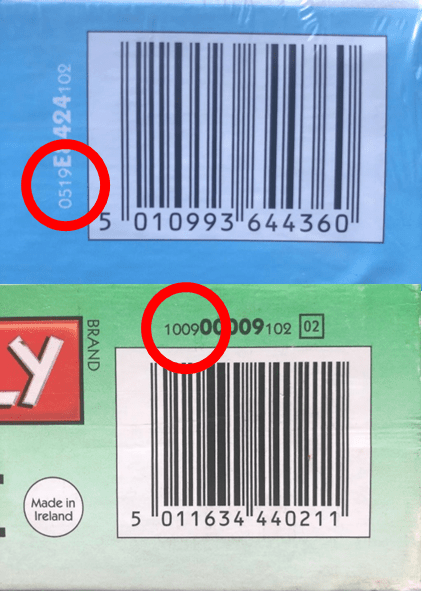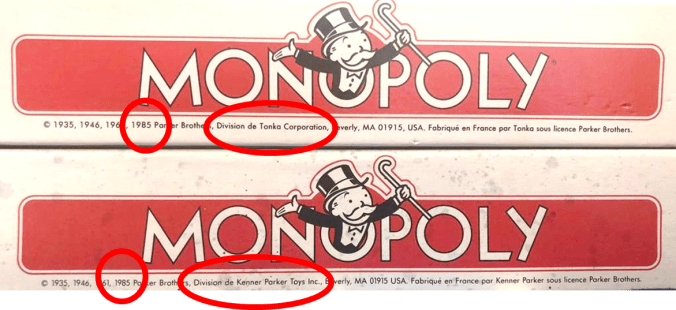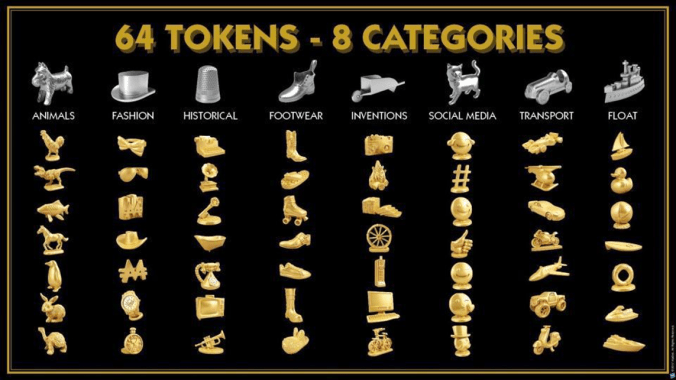German edition photographed


Dedicated to the Collection and History of Monopoly
German edition photographed




Canadian Edition pictured


The results of the 2022 Throwback Token Vote have been announced today (31st May) by Hasbro.
The Thimble will be returning to the Monopoly token line-up from Autumn 2022 (2023 in most international markets). The Thimble was one of the six original tokens from the 1936 UK debut of Monopoly, and was removed during the 2017 Token Madness vote – along with the Wheelbarrow and Boot.
However, this news has come at the expense of the T-Rex token, which has been officially retired. The T-Rex was one of three new tokens introduced in 2017, which also welcomed the Penguin and Rubber Duck. Spending just five years in classic Monopoly sets, it now has the shortest appearance of all the standard tokens.

The 2022 Throwback Token Vote ran for almost a month, and gave Monopoly fans the chance to bring back one previously retired token in the place of a token in the current line-up. The Thimble, Wheelbarrow, Iron, Horse & Rider, Boot or the USA exclusive Money Bag were the candidates for return. This is the third global vote – after the 2013 and 2017 events.
The official Monopoly Instagram account appeared to reveal this would become an annual event – “It’s our annual Token Vote”, however the post has since been edited to remove all mentions of ‘annual’, although one reply remains indicating that another token vote could be returning next year.


Monopoly has announced that one previously retired token will return to Monopoly sets. A current token would be dropped to make room. The decision is being taken via an online poll – https://www.monopolytokenvote.com/
This is the third time that Hasbro has freshened up the token line-up through an online poll – 2013 and 2017 were the last two events. These ballots saw the Iron, Boot, Thimble and Wheelbarrow replaced by the Cat, Penguin, T-Rex and Rubber Ducky.
Voting will last for three weeks and new editions of Monopoly (with the new token change) are expected to reach store shelves by 2023.
The list of tokens which could return sadly does not include the Cannon (Howitzer) which was dropped in 2008 despite appearing on the first social media teaser. However, the USA exclusive Money Bag (1998 – 2007) is included and could therefore appear in standard Monopoly editions for the first time in the UK and Worldwide market.
The poll was initially teased on 19th March 2022 by Monopoly via Facebook. The post shows silhouettes of retired tokens.
The idea was once again teased on 25th April 2022 by showing the changes made during the 2017 Token Madness poll
The poll was officially launched on 28th April 2022
Six previously retired tokens are candidates for return:

All current eight tokens are candidates for retirement:

One token must be selected for return, and one token must be selected for removal. It appears that it is not limited to one vote per person, with unlimited votes possible.



The Landlord’s Game was patented by Lizzie Magie in 1904. One of the first board games to use a ‘continuous path’, rather than the traditional linear board, it set out the foundations for the board game which would later become Monopoly.
The Landlord’s Game was designed to show that rent only makes property owners richer while leaving tenants worse off.
This early board game has many similar features to Monopoly. It introduces the concept of ‘ownership’ of a space on the game board. A player who later lands on the same space performs a different action to that of the first player (ie paying rent rather than purchasing the property) despite the original player’s token no longer being on the same space.
Magie submitted a copy of the game to Parker Brothers in 1910, which George Parker decided against publishing.
The game did not have a huge uptake, primarily being played by Quakers, Georgists and university students.

The original patent for The Landlord’s Game expired in 1921. This resulted in many handmade copies circulating, also known as Monopoly. Therefore, to regain control over these handmade games, a second version of the Landlord’s Game was patented in 1924, this time under her married name of Elizabeth Magie Phillips. This version of the game included named streets.
This 1924 edition has properties named after streets and locations in Chicago. It also introduced a new ‘Monopoly’ rule, that higher rents could be charged if all three railroads and utilities were owned. Also, properties could be improved, and rent increased, by adding ‘chips’ – similar to the modern-day Houses and Hotels.
Magie once again submitted The Landlord’s Game to Parker Brothers. Geroge Parker still declined, stating that the game was ‘too political’.

Daniel Layman published a variant of The Landlord’s Game in 1932 called The Fascinating Game of Finance – later renamed to Finance.
This version featured four railroads (one on each side of the board), Chance and Community Chest cards and spaces and grouped properties together by symbol, instead of colour.
This version of the game was taken back to Atlantic City and the properties were renamed to that of streets from the city. This is the version of the game that credited Monopoly inventor, Charles Darrow learned. He began distributing handmade copies – named ‘Monopoly’. It included the original misspelling of Marvin Gardens and the renaming of the Shore Fast Line as the Short Line. Demand for the game soon increased and Darrow contacted a printing company. Darrow, his son and his wife created the designs commonly seen on boards today. Black locomotives on the railroad spaces, the car on Free Parking, the red arrow for Go, the tap on Water Works, the light bulb on Electric Company, the question mark on Chance spaces and the colours above the property name.


After even bigger demand, Darrow attempted to sell Monopoly to a number of publishers. Firstly, to Milton Bradley, who rejected it. Then to Parker Brothers, who rejected the game as it was ‘too complicated, too technical, and it took too long to play’.
However, the game sold well during the Christmas season of 1934 in Philadelphia and the President of Parker Brothers contacted Darrow to schedule a meeting.
In the meeting, it was agreed that Parker Brothers would purchase Monopoly and the remaining inventory. However, Parker Brothers later learned that Darrow was not the sole inventor of the game. To ensure the company had the legitimate undisputed rights to the game, they brought out many patents and copyrights of similar or clone games. Primarily, Magie’s 1924 patent of The Landlord’s Game, along with Finance. After the initial publication, Parker reached a court settlement with Rudy Copeland’s Inflation, and agreements were made with Big Business and Easy Money (based on Finance).
In a second meeting, Darrow admitted he had copied the game, and he and Parker reached a new revised royalty agreement, which gave Parker Brothers the right for the rest of the world.

Before being printed in the United States of America, Parker Brothers sent a copy of the game to John Waddingtons, a playing card producer who had previously sent Parker Brothers a copy of Lexicon. The managing director of Waddingtons, Victor Watson, asked his son Norman to play test the game over the weekend. Norman was very impressed by the game and persuaded his father to make one of the first transatlantic calls – this call resulted in Waddingtons obtaining a license to produce the game outside of the United States.
Watson believed that for the game to be a success in the UK, the Atlantic City property names should be switched for those of London. Watson, with his secretary Marjory Phillips, headed to London to look for locations. 21 locations were chosen with 4 stations as well. The 22nd location, The Angel, Islington was chosen as it was the restaurant that Watson and Phillips later met in to discuss which properties should be chosen.
The $75 Luxury Tax was changed to £100 Super Tax, and the £200 or 15%-Income Tax was changed to a flat fee of £200 only.
The American style Car on Free Parking and term Community Chest remained.

For Monopoly editions made by Hasbro, the easiest method is to check the production code. The first four digits identify the month and year the edition was created (MM/YY). This includes Monopoly sets released under the Waddingtons or Parker brand after Hasbro acquired the company


For non-Hasbro releases (e.g. Winning Moves), the best estimate of date will be the copyright year on the side of the box. Usually this will be the year that the edition was released. However, if the edition was released early in the year, the copyright may be from the previous year

For older classic Monopoly sets, an estimate can be identified by looking at the copyright year. This may be on the box, board, or instructions. Use the latest year as pieces were made in bulk and reused in later editions – therefore a set may have many years. To make this year more accurate, look at minor changes to the box within that period. In Europe and USA, through the 1960s, many boxes are dated ©1961 despite slight differences.
Despite both being ©1985, the change from Parker Kenner to Tonka means this edition is more likely from 1987.

Within the UK (and some international releases), Monopoly was released under Waddingtons until the Hasbro acquisition in 1994. The Waddingtons and Parker brand continued to be used until the Hasbro brand became permanent in 2009
Branding for USA and many international releases:
| 1935 | Parker Brothers |
| 1968 | General Mills |
| 1985 | Kenner Parker Toys |
| 1987 | Tonka |
| 1991 | Hasbro |
Within Spain, classic editions of Monopoly were released by ‘Borras’ until Hasbro took over production permanently in 1996. Variants such as Junior, European & Playmaster were released during this period without Borras involvement.
Finally, many different variations were released within the UK and USA during the 1930s to 1950s – especially due to shortages during the war. The best method of identification is comparing the boards, pieces and box to that of already dated sets (many examples within this website).
Examples of:
In 2021, Hasbro announced that they would be changing the message on all 16 Community Chest cards included within a classic release of Monopoly – the amount gained/loss would remain the same. An online poll was held where voters could choose between two messages. These were the final results:

This was not the first time the Chance & Community Chest cards have been altered. Several cards have been previous retired and replaced – although this is the first time a whole deck has changed. From 2018, the controversial ‘Money Grab’ was introduced to the Chance deck – a foreshadow to the later release of ‘Cash Grab’


In 2017, after the success of the Save Your Token Event, Monopoly attempted to freshen up the line-up of Monopoly tokens again with the 2017 Token Madness vote. This time, no token was safe, with it being possible that a completely new line-up of eight tokens would be chosen.
Each token was put into a category, and 7 tokens were designed for each category bringing the total choice up to 64 different tokens! Voters were asked to pick which eight they would most like to see in future releases.

Betting odds offered by PaddyPower on which token(s) would be voted out

Ultimately, the T-Rex, Rubber Duck and Penguin finished in the Top 8, with the Thimble, Wheelbarrow and Boot dropping out from new editions. These changes mean that there are now 5 Animal related tokens in new Monopoly sets, with the Battleship, Top Hat and Racecar surviving.


Two special editions were released. Token Madness features eight of the 56 addition tokens – this had a worldwide release.
Signature Token was released in USA and Germany only, and features all 64 tokens

Many of the 56 Token Concepts have been re-appeared in other Monopoly sets. So far I have spotted three different editions to have gained tokens from this vote.
Purple – Longest Game Ever (external link)
Green – For Millenials
Blue – Cheaters Edition [USA Bonus]
In addition to Red – T-Rex, Penguin & Rubber Duck in Monopoly (2017 + )
2015 marked the 80th anniversary of the introduction of Monopoly
Many special editions were released to celebrate the occasion

As has become standard in recent decades, a new Anniversary Edition was published. The board and cards were given a ‘retro’ design. Eight tokens were included to represent the past eight decades: lantern, bathtub, cannon, horse, car on podium, train, sack of money and cat


Moreover, three reprints of current classic Monopoly games were released: Monopoly, Monopoly Junior & Monopoly: Electronic Banking.
These editions remain unchanged from their previous release, except with the addition of another ‘special’ token – Mr Monopoly (see above)
I want this